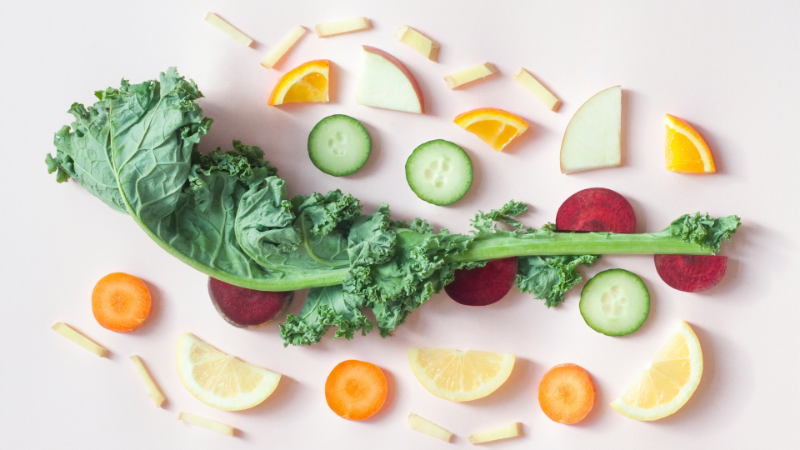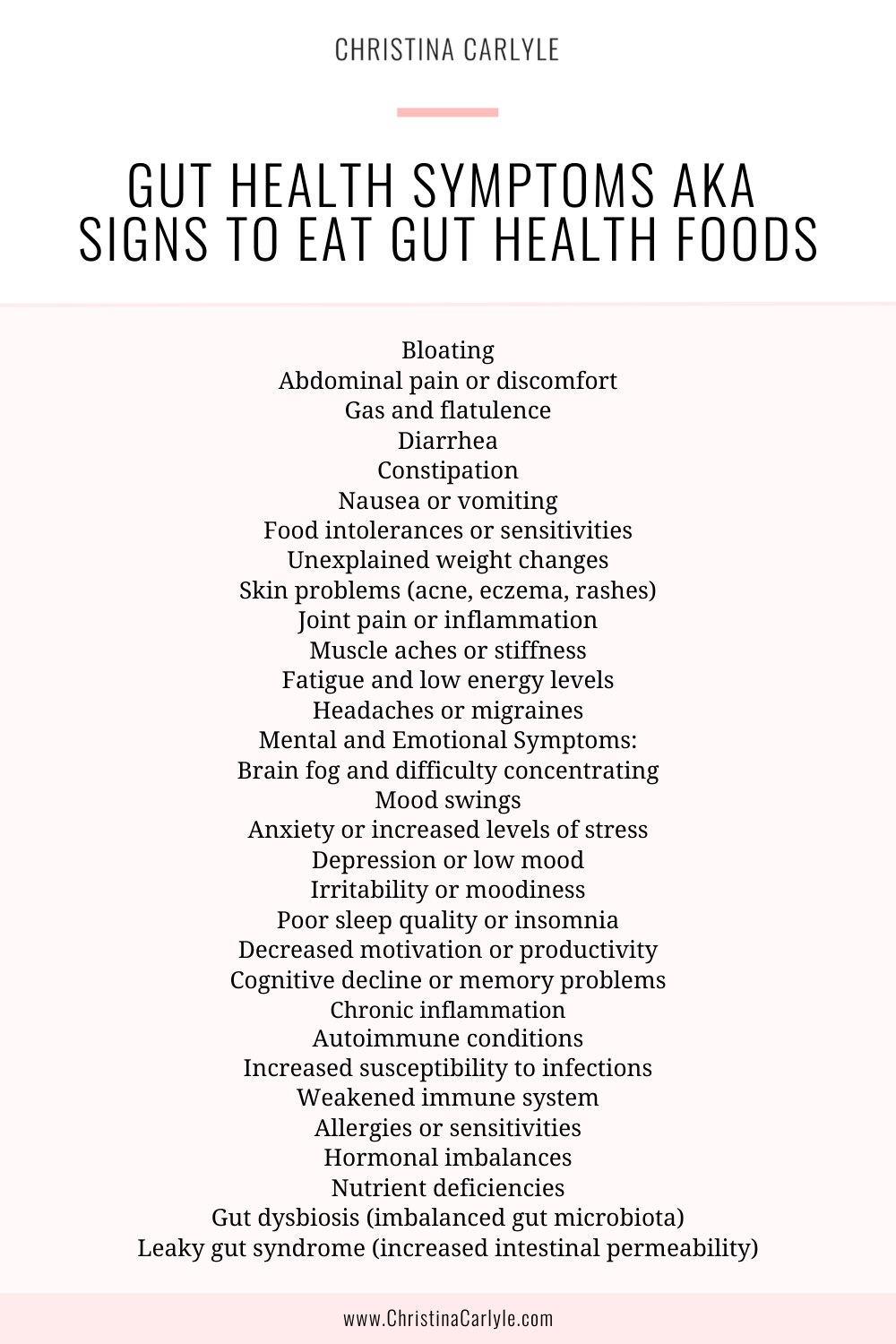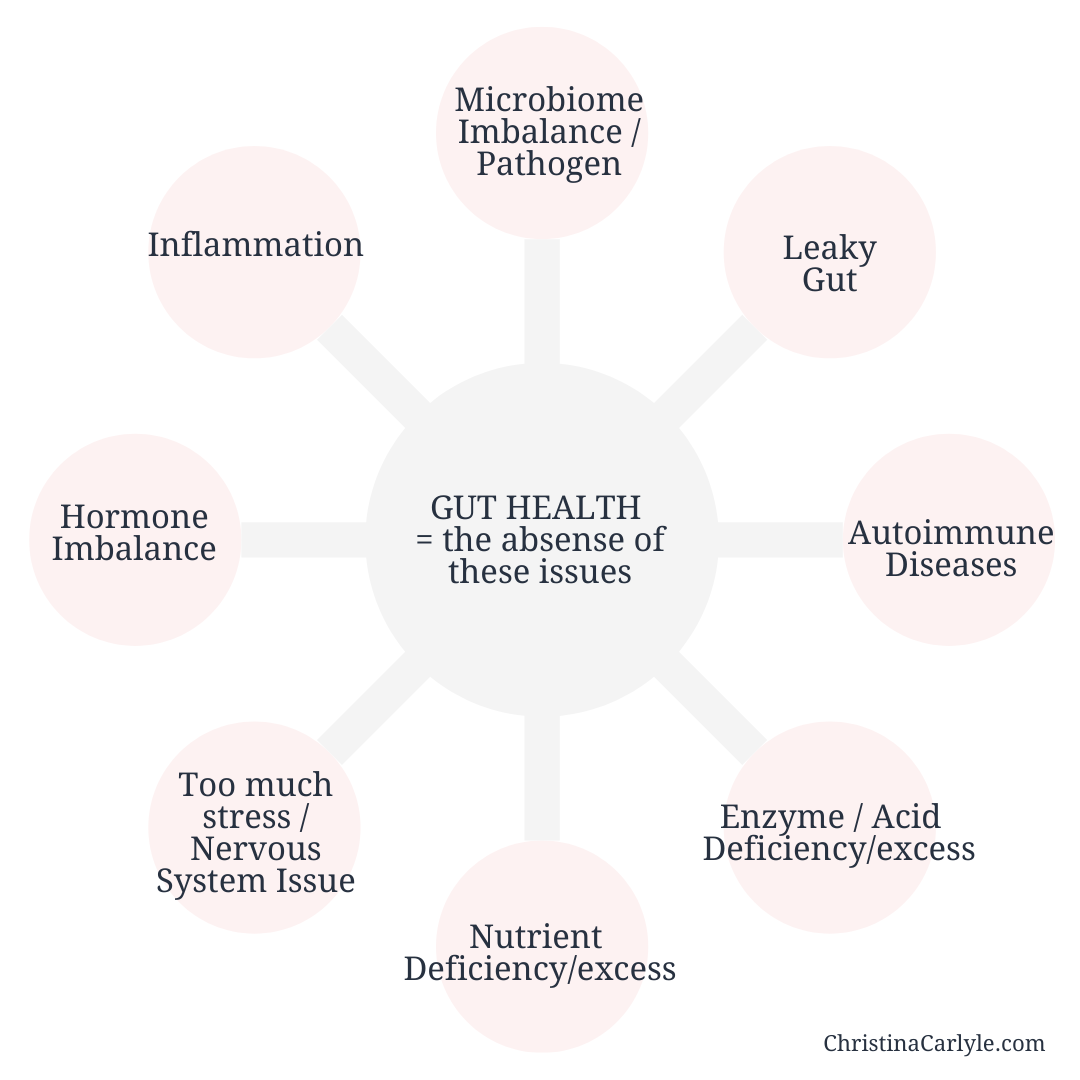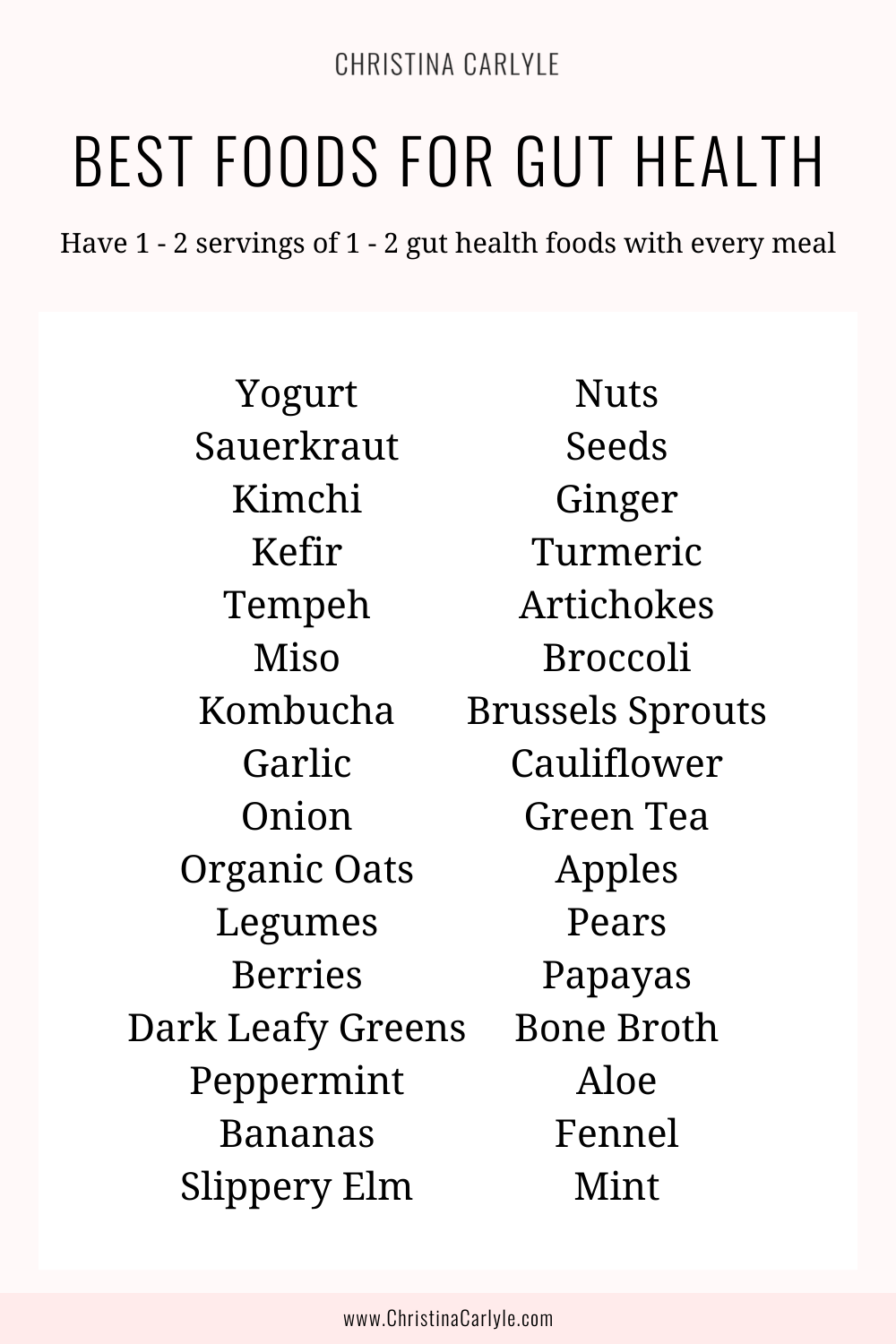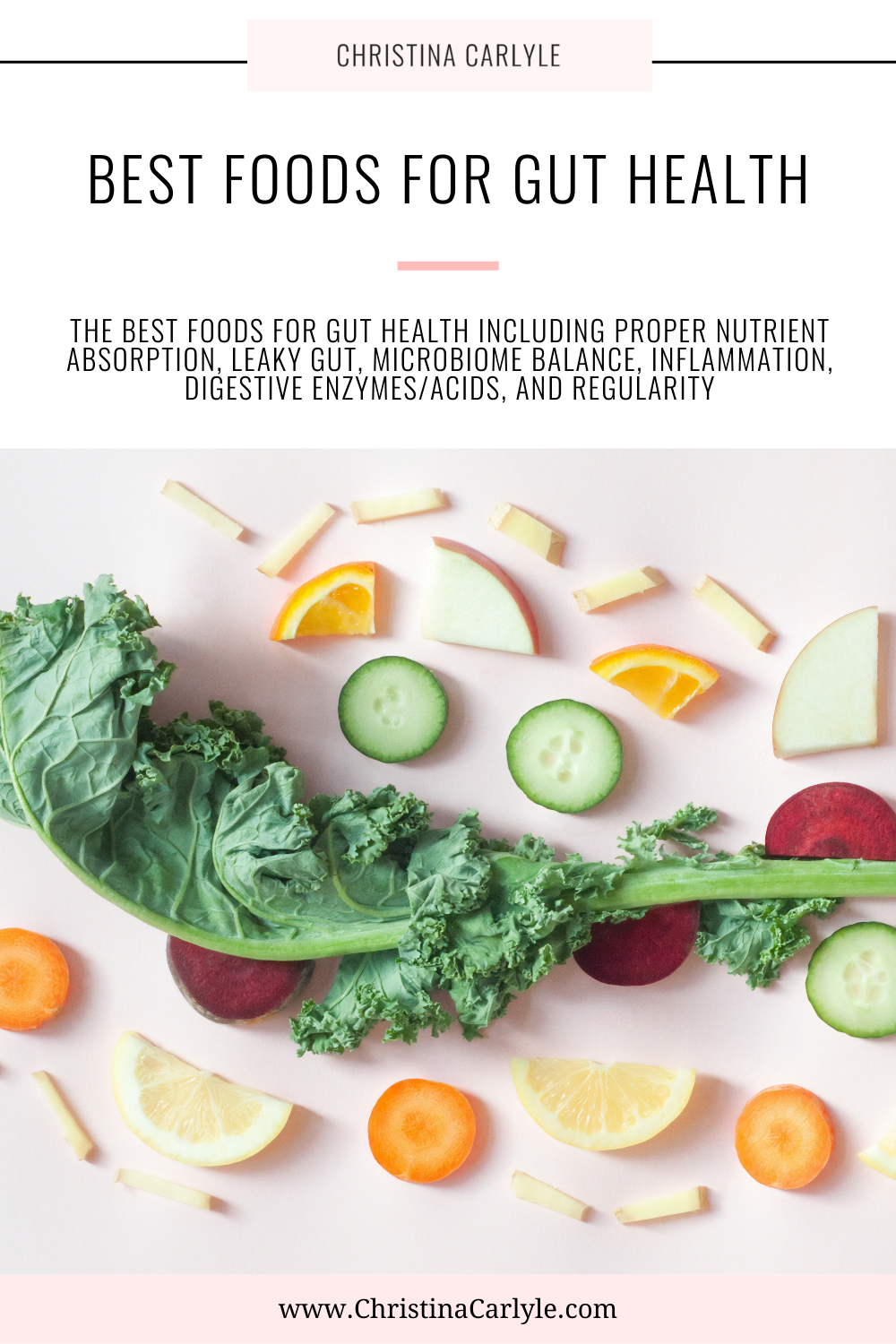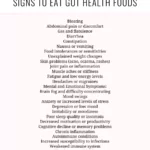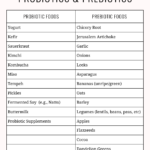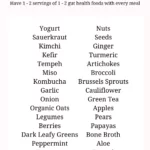Last Updated on June 14, 2023
If you’re serious about gut health then eating gut health and healing foods is important.
If you’ve been following my Gut Health series you already know how food can cause 7 gut health issues, weight gain, and a ton of symptoms that make it damn near impossible to lose weight and feel great.
So enough about the problems already, let’s dive into how to help your body with the best foods for gut health.
The foods I’m sharing are scientifically proven to provide the nutrients, compounds, and phytochemical properties needed to support restoration and optimal functioning and healing of the digestive system. These foods don’t heal the gut… they have the nutrients & fibers needed to help the body repair itself and function properly.
Why you need Gut Health Foods
Here are some motivating reasons to include gut-friendly foods in your diet during the gut-healing process:
- Reduce inflammation: Many gut health foods have anti-inflammatory properties, which can help reduce inflammation in the gut. Chronic inflammation is often associated with various digestive disorders and can hinder the healing process.
- Promote gut lining repair: Certain foods, such as bone broth and slippery elm, contain compounds that can help repair and strengthen the gut lining. This is crucial for preventing leaky gut syndrome and improving nutrient absorption.
- Restore gut microbiome balance: Some gut health foods, like fermented vegetables and coconut products, support a healthy balance of beneficial bacteria in the gut. This is important for proper digestion, nutrient absorption, and overall gut health.
- Provide essential nutrients: Many gut health foods are rich in vitamins, minerals, and antioxidants that are necessary for optimal gut function and the healing process. These nutrients help support the growth and repair of gut tissues.
- Aid digestion: Gut health foods often contain enzymes, fibers, and other compounds that aid in digestion. They can help break down food, enhance nutrient absorption, and alleviate common digestive issues like bloating and gas.
- Support immune function: A significant portion of the immune system resides in the gut. By consuming gut health foods, you can support a healthy gut environment, which in turn promotes a stronger immune system and better overall health.
- Alleviate symptoms: Many gut health foods have soothing properties that can alleviate symptoms associated with digestive disorders, such as fatigue, cravings, water retention, bloating, irregularity, heartburn, reflux, post-nasal drip, gas, and abdominal discomfort. This can improve overall comfort and quality of life and make it easier to lose weight, too.
Bottom line… everyone needs to eat specific foods to maintain gut health and prevent gut health issues.
If you have any of the following symptoms you need to start eating more gut health foods ASAP.
Incorporating gut-health foods into your diet is beneficial, but it’s also crucial to address other lifestyle factors that can impact gut health, such as managing stress levels, getting adequate sleep, and staying hydrated.
It’s also important to note that you should remove foods that have a negative impact on gut health from your diet…
Because healthy gut-friendly foods won’t be able to be metabolized properly if you’re still consuming toxic, processed, reactive foods that cause gut health issues in the first place.
Gut health issues can quickly affect the metabolism and your body’s ability to absorb nutrients. When this happens the body becomes more nutrient deficient and metabolic dysfunction will get worse and it becomes harder to lose weight. Left untreated, symptoms on the list above tend to snowball and cause other health issues.
ABOUT GUT HEALTH FOODS
Luckily the gut responds quickly to the right kinds of foods… assuming you’re eating the right amounts, of the right foods, with the nutrients needed to trigger results.
There are two ways I like to categorize gut health foods. They are healing and balancing.
Remember, gut health is defined as the absence of 7 main gut issues.
Certain foods have the right nutrients, fibers, and phytochemicals needed to heal some of these issues.
Addressing the other issues requires balancing the gut microbiome, digestive acids, enzymes, and hormones.
There are foods that provide the nutrients needed to maintain and restore all of the different gut health issues and you’ll see them all below.
GUT HEALTH DIET FOODS
Eating a healthy and balanced diet can significantly boost gut health and metabolism… because these foods are nutrient-dense but low-calorie, they’re great for immunity and metabolic function Weight loss is a common side effect of healing your gut and an unhealthy gut can make it harder to lose weight/easier to gain weight.
Here are some ways that the nutrients in my recommended foods can positively impact gut health & metabolism:
Fiber-Rich Foods: Consuming an adequate amount of dietary fiber is crucial for a healthy gut. Fiber serves as a prebiotic, providing nourishment to beneficial bacteria in the colon. Foods such as fruits, vegetables, whole grains, legumes, and nuts are excellent sources of fiber. Fiber promotes satiety, helps control appetite, regulates blood sugar levels, and acts as a prebiotic to support a diverse gut microbiome.
Fermented Foods: Fermented foods contain beneficial bacteria or probiotics that can help support a healthy gut microbiota. Examples include yogurt, kefir, sauerkraut, kimchi, tempeh, and miso. These foods introduce live bacteria into the gut, which aids in digestion and promotes a balanced gut flora. Probiotics from fermented foods can reduce gut inflammation, support gut barrier function, and enhance nutrient absorption.
Polyphenol-Rich Foods: Polyphenols are plant compounds found in foods like berries, dark chocolate, green tea, and colorful fruits and vegetables. They have antioxidant properties and can have a positive influence on gut health by supporting the growth of beneficial bacteria. Polyphenols also have anti-inflammatory effects, reducing gut inflammation and promoting a healthy gut lining. Some polyphenols, such as catechins in green tea, may aid in weight loss by boosting metabolism and fat oxidation.
Healthy Fats: Including sources of healthy fats in the diet, such as avocados, nuts, seeds, and olive oil, can have a positive impact on gut health. These fats help reduce inflammation in the gut and provide essential nutrients for the gut lining. Omega-3 fatty acids and monounsaturated fats found in healthy fats have been associated with improved gut health and may contribute to weight management.
Probiotic-Rich Foods: Probiotics are beneficial bacteria that promote gut health. Including probiotic-rich foods in your diet, such as yogurt and other fermented foods, can help introduce these beneficial bacteria into your gut. Probiotics support gut health by reducing inflammation, enhancing gut barrier function, and maintaining a balanced gut microbiota, which may have implications for weight management.
Hydration: Drinking an adequate amount of water is essential for maintaining good gut health. Water helps with digestion, nutrient absorption, and maintaining proper bowel movements. Staying hydrated supports optimal gut function and can help prevent constipation, a common issue that can negatively impact gut health.
It’s also important to limit processed foods and sugars. Highly processed foods and excessive sugars can negatively impact gut health by promoting the growth of harmful bacteria and inflammation. It’s best to minimize the consumption of processed foods and opt for whole, unprocessed foods whenever possible.
The bottom line, it’s impossible to heal your gut with foods if you continue to eat and drink things that wreck it.
For the best results follow a complete multi-system approach…
While also keeping stress to a minimum and rest high – because it’s difficult to heal the gut if you’re not also addressing hormones, inflammation, detox pathways, and the liver.
HINT: That’s what my Total Transformation Program does and why it works so well.
It reveres everything that can contribute to weight (including gut health and everything else) so you can lose weight and feel great ASAP.
FOODS WITH THE MOST GUT HEALTH BENEFITS
Here’s a list of gut health foods with the most comprehensive gut health benefits.
Remember there are 7 issues that affect gut health and weight loss. Each of those 7 issues has its own list of ‘best foods’ to heal it. The following list is all of the foods that help heal multiple gut issues at once.
They work synergistically to help heal the gut and reverse symptoms & damage quickly and create an environment for microbes, enzymes, and acids to balance.
For the best results eat 1-2 servings of 1-2 of these gut-healing foods at every meal.
| Food | Nutrients and Phytochemicals | Gut Health Benefits |
|---|---|---|
| Yogurt | Probiotics, Calcium, Vitamin D | Supports the growth of beneficial gut bacteria, aids digestion, promotes bone health |
| Sauerkraut | Probiotics, Fiber, Vitamin C | Improves gut health, supports digestion, enhances immune function |
| Kimchi | Probiotics, Fiber, Vitamin C, Beta-carotene | Promotes gut health, aids digestion, provides antioxidant protection |
| Kefir | Probiotics, Calcium, Vitamin K, Vitamin B12 | Enhances gut flora, supports bone health, aids in nutrient absorption |
| Tempeh | Probiotics, Protein, Fiber, Isoflavones | Supports gut health, provides plant-based protein, aids in hormone balance |
| Miso | Probiotics, Protein, Fiber, Vitamin K | Improves gut microbiota, supports digestion, contributes to nutrient intake |
| Kombucha | Probiotics, Polyphenols, Antioxidants | Supports gut health, aids in detoxification, provides antioxidant effects |
| Garlic | Prebiotics (Inulin, Fructooligosaccharides), Allicin | Nourishes beneficial gut bacteria, reduces harmful bacteria, supports immune function |
| Onion | Prebiotics (Inulin, Fructooligosaccharides), Quercetin, Sulfur compounds | Promotes the growth of healthy gut bacteria, reduces inflammation, supports heart health |
| Organic Oats | Fiber, B Vitamins, Magnesium | Supports regular bowel movements, nourishes gut bacteria, provides nutrition and sustained energy, |
| Legumes | Fiber, Protein, Iron, Zinc | Supports healthy bowel movements, nourishment for gut bacteria |
| Berries | Fiber, Antioxidants (Anthocyanins, Vitamin C) | Promotes gut health, reduces inflammation, supports immune function |
| Dark Leafy Greens | Fiber, Vitamins (A, C, K), Calcium, Iron | Supports gut motility, provides antioxidants, helps maintain a healthy gut environment |
| Nuts | Fiber, Healthy Fats (Omega-3 fatty acids), Vitamin E | Supports gut health, provides satiety, and contributes to a balanced gut microbiota |
| Seeds | Fiber, Omega-3 fatty acids, Phytoestrogens | Supports healthy digestion, provides anti-inflammatory effects, contributes to gut microbial diversity |
| Ginger | Gingerol, Anti-inflammatory compounds | Eases digestion, reduces inflammation in the gut, supports gut motility |
| Turmeric | Curcumin, Anti-inflammatory compounds | Helps reduce gut inflammation, supports gut healing, aids in digestion |
| Artichokes | Prebiotics (Inulin), Fiber, Antioxidants (Cynarin) | Supports beneficial gut bacteria growth, aids digestion, provides liver support |
| Broccoli | Fiber, Vitamins (C, K), Sulforaphane | Supports gut health, provides antioxidants, has anti-inflammatory effects |
| Brussels Sprouts | Fiber, Vitamins (C, K), Glucosinolates | Supports gut health, provides anti-inflammatory effects, aids in detoxification |
| Cauliflower | Fiber, Vitamin C, Sulforaphane | Supports healthy digestion, provides antioxidants, contributes to gut microbial balance |
| Green Tea | Polyphenols (Epigallocatechin gallate), Catechins | Provides antioxidant protection, supports gut health, may reduce the risk of certain diseases |
| Apples | Prebiotics (Pectin), Fiber, Antioxidants (Quercetin) | Nourishes beneficial gut bacteria, promotes digestive health, provides antioxidant benefits |
| Pears | Prebiotics (Pectin), Fiber, Antioxidants (Flavonoids) | Supports gut health, aids in digestion, provides antioxidant protection |
| Papayas | Fiber, Vitamin C, Enzyme (Papain) | Promotes healthy digestion, supports gut health, provides immune-boosting properties |
Please note, even though these foods are proven to help gut health doesn’t automatically mean that these foods are a good fit for your bioindividuality. You can have your own unique adverse reaction(s) to foods.
Diagnostic testing would be needed to pinpoint the foods that are best for you and your gut.
Different gut health issues require a specific protocol needed to address all 7 factors that affect gut health.
In addition to the best foods for gut health, there are other foods and supplements I’d recommend using as a part of your gut health plan.
The foods above are needed to maintain gut health. The following foods can be used as ‘boosters’ to accelerate healing.
The Best Healing Gut Health Foods
These gut health foods are best for GI tract repair and reducing inflammation so you can get even better results.
For the best results eat 1-2 servings of 1-2 of these gut-healing foods at every meal:
- Bone broth: Rich in collagen, gelatin, and amino acids, bone broth helps soothe and heal the gut lining, reducing inflammation and promoting gut health. Try my easy bone broth recipe. I love sipping on this and using it to saute veggies all year round. It’s so good.
- Aloe vera: Aloe vera gel is known for its soothing and healing properties, particularly for digestive issues. It can help reduce inflammation and support gut healing.
- Slippery elm: Slippery elm has a mucilaginous texture that can coat and soothe the gut lining. It is commonly used to alleviate symptoms of digestive conditions like gastritis and acid reflux.
- Papaya: Papaya contains an enzyme called papain, which aids in the digestion of proteins and can help alleviate symptoms of digestive discomfort. It also provides fiber and various nutrients that support gut health.
- Coconut products: Coconut oil and coconut milk contain medium-chain fatty acids that have antimicrobial properties, helping to combat harmful gut bacteria and promote a healthy gut environment. Add unsweetened coconut flakes, oil, or yogurt into your diet and your gut will thank you.
- Fennel: Fennel has carminative properties, which means it can help alleviate bloating, gas, and digestive discomfort. It also provides fiber and other compounds that support gut health.
- Chamomile tea: Chamomile tea has calming and anti-inflammatory properties that can help soothe the gut and reduce digestive discomfort.
- Mint: Mint has been used for centuries to relieve digestive symptoms such as indigestion and bloating. It can help relax the muscles of the gastrointestinal tract and promote healthy digestion.
- Peppermint: Peppermint has been used for digestive relief for centuries. It may help ease symptoms like bloating, cramping, and indigestion.
- Bananas: They are gentle on the digestive system and provide pre and probiotic fibers, vitamins, and minerals that promote healthy gut function.
Speaking of pre and probiotics, it’s also important to supplement your diet with pre & probiotic foods. They’re mandatory to create the environment needed to balance gut microbes and prevent/reverse pathogens & imbalance.
PROBIOTICS AND PREBIOTICS FOODS FOR GUT HEALTH
Probiotics are live microorganisms (good bacteria) that provide health benefits by supporting digestion, immune function, and maintaining a balanced gut microbiota. They can be found in certain foods and supplements.
Prebiotics are dietary fibers that serve as food for beneficial bacteria in the gut. They help nourish and promote the growth of good bacteria in the colon. They are found in certain foods.
Using both probiotics and prebiotics together can help promote a healthy gut and overall well-being.
The following foods are highest in prebiotics and probiotics.
For the best results eat 1-2 servings of 1-2 of these pre & probiotics foods at every meal.
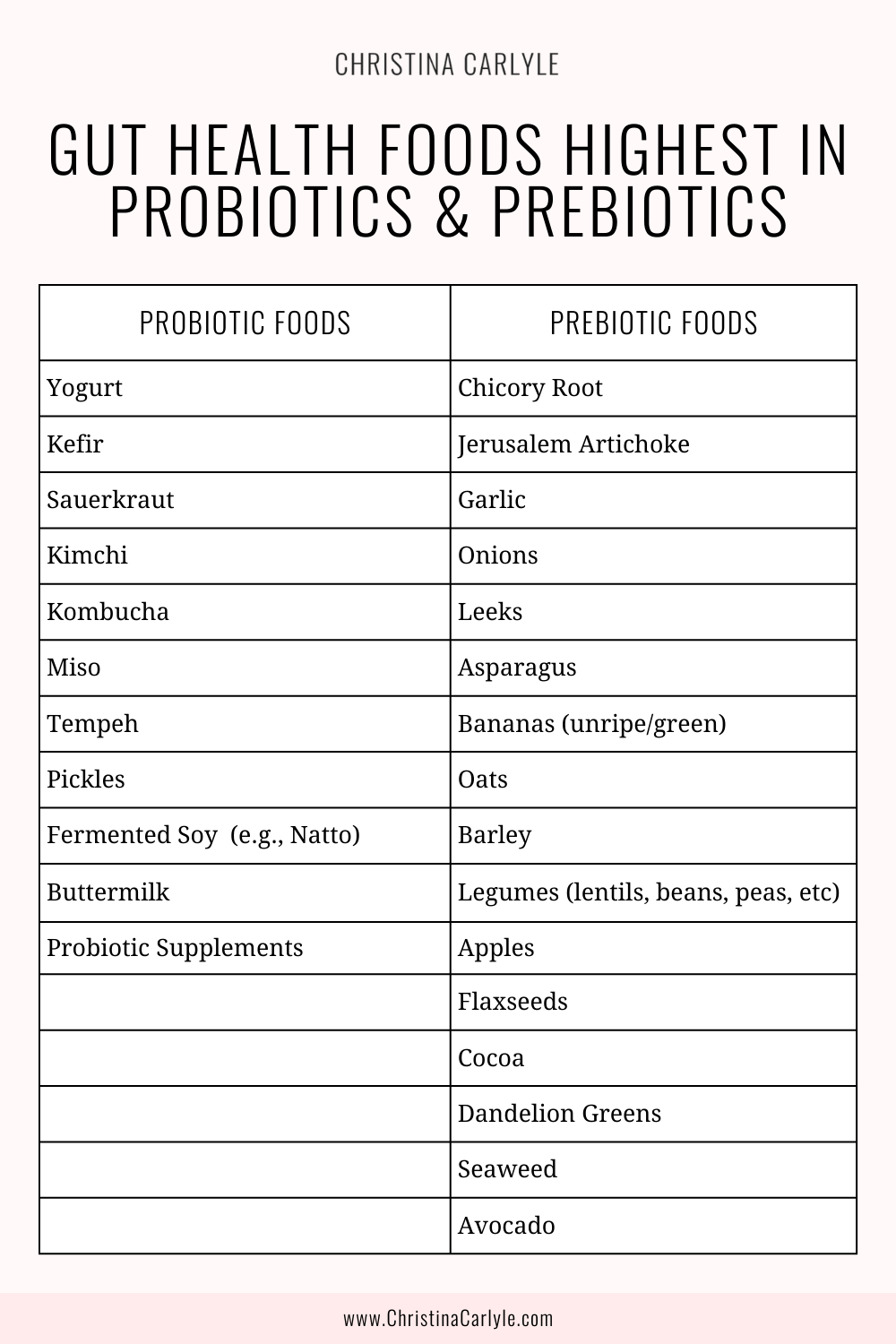
So in review, there are gut health foods needed to maintain gut health, there are foods needed to restore gut health, and there are foods needed to balance gut enzymes/acids. You need 1-2 servings of foods from each category at each meal… so that’s 3-6 servings of gut health-friendly foods per meal.
I recommend picking a few of the following gut health foods from each category (veggies, fruits, fat, etc.) then start eating them daily.
Vegetables:
- Leafy greens
- Broccoli
- Cauliflower
- Artichokes
- Garlic
- Onion
- Asparagus
- Brussels sprouts
- Carrots
Fruits:
- Berries
- Apples
- Pears
- Papayas
- Bananas
Fats:
- Avocado
- Olive oil
- Coconut oil
- Flaxseeds
- Chia seeds
Probiotic-rich foods:
- Yogurt
- Sauerkraut
- Kimchi
- Kefir
Eat up!
I hope this helped you! Subscribe below so you don’t miss my next training.
xo
Your Coach and Biggest Cheerleader,
![]()
MORE GUT HEALTH & WEIGHT LOSS INFO
Check out these related articles to fill in more of the “gut health puzzle” so you’ll understand more about the different aspects of gut health, how they cause symptoms & weight gain, and how to optimize your gut health to maximize your weight loss potential:
- Gut Health and Weight Loss
- What are Probiotics?
- Probiotics and Weight Loss
- What are Prebiotics?
- The Best Foods for Gut Health
- What is Leaky Gut?
- Gut Health Supplements
- Intestinal Inflammation
- Gut Microbiome
Remember, if you have gut health symptoms you most likely also have metabolic dysfunction. This free training explains more about metabolic dysfunction & how I fix it so you can lose weight & feel great ASAP.

